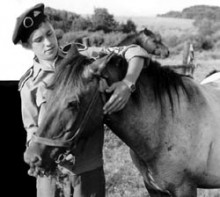Valery Shevchenko, representative of the Carpathian regional tourist council, suggested we take a ride to Lake Andriyivske beyond the village of Serednie in Uzhhorod oblast. Our point of destination was a farmstead called Zolota Pidkova [Golden Horseshoe] by the lake. First it was a small smithy doing good business. Later it was replaced by a barn to store hay. And then a farmer named Vasyl Harat bought the plot. He was unhappy. He had a plan to make use of seventy hectares, but not enough money for any adequate improvements plus a great deal of work to do. We saw a little squat structure in a small valley and the dark forms of pigs trudging there, some smaller, others bigger.
“They’re Vietnamese,” Shevchenko informed me.
We stood still, digesting the fact that pigs are not only Ukrainian, but also an international phenomenon.
The sows walked with their offspring, like people’s deputies with their electorate. A lyrical picture. Local poets could write verse — if someone agreed to pay for it.
“Where do they spend the day?” I asked.
“Out in the field,” Vasyl Harat grinned, “and in the evening every one returns to the barn to sleep. Like students at a boarding school.”
“Isn’t it dangerous for the pigs and for you,” Valery Shevchenko wondered, “I mean, they could get caught.”
“No way,” Harat was perfectly confident. “No one can catch my pigs. They’re so smart, we’re the only ones who can. Sometimes. They’re wild, you know. They walk off limits and know it, because hungry peasants start chasing them, so they run back.”
However, the key personae at the Golden Horseshoe were Hutsul horses, about twenty, among them a rarity, the tarpan wild forest horse, the result of a cross between a [local] stallion and a Czech mare. In fact, such forest horses spontaneously mating with the Mongol “occupiers” sired the Hutsul breed.
Experts visiting from Slovakia and Poland marveled the relic tarpan. They had nothing like it. In other words, Vasyl Harat had won international acclaim.
And the Vietnamese pigs! Someone had tried to smuggle them out of Ukraine in a suitcase, but the rascals started to squeal their heads of. The plot was foiled, and then a farmer from Velyki Berezniaky took possession of them. But the place was too cold for them, so he sold them to Vasyl Harat in Andriyivka.
Now it is the second generation. Everybody was happy, eyeing the livestock. Unfortunately, the blowtorch went out of service and there was no money to buy a new one. Too bad the local authorities were still to perceive the importance of developing the rudiments of tourism among the local children. And so Vasyl Harat with his family — father Vasyl Oleksiyovych, mother Sofiya Vasylivna, sister, and son (studying at the Mukacheve Veterinary College) took over the job.
Previously, the farmer had worked as a waiter at the Edelweiss Restaurant, quite famous under the Soviets. And even then he preferred to draw Hutsul horses and stables somewhere in a corner, rather than lug around laden trays. It was his dream. He was strongly attracted to the noble animals, originating from Verkhovyna. Eventually, the Red Star State Farm in Kybliarsky allocated him a plot no one needed or ever would. Now he planned to lay an itinerary to Perechynshchyna across Mt. Makovytsia (15 kilometers away).
“There it is. Mt. Makovytsia,” he pointed, “see where the clouds are the thickest. That’s the ridge dividing two districts. There are strange clearings and precipices so deep your horse’ll get killed if it falls down. Nothing but rock. Volcanic outbursts overgrown with lime, trout jumping in the stream. Cool when it’s scorching hot and not bad in winter.”
Someone let it slip that it was time for a bite, but we were instantly sorry about the remark. We could see that Vasyl Harat had reached the bottom of misery. He went and returned with a loaf (apparently his last), then picked several asthenic tomatoes in the kitchen garden, dug up an onion. He offered baked potatoes, but we heroically declined so he would have something for dinner.
Indeed, the yearly upkeep of a Hutsul horse costs 1,200 hryvnias. He just barely made it.
However, now and then the Golden Horseshoe is shown to guests, along with the still functioning smithy. On such occasions, troyisti muzyky stylized minstrel trios are invited and stacks of wheat are threshed by hand. If this were not enough, Harat takes his handmade round guitar and sings about Hutsul horses valiantly climbing the mountain, slipping, falling, dying, but never giving up.
This golden horseshoe must be from one such horse.







